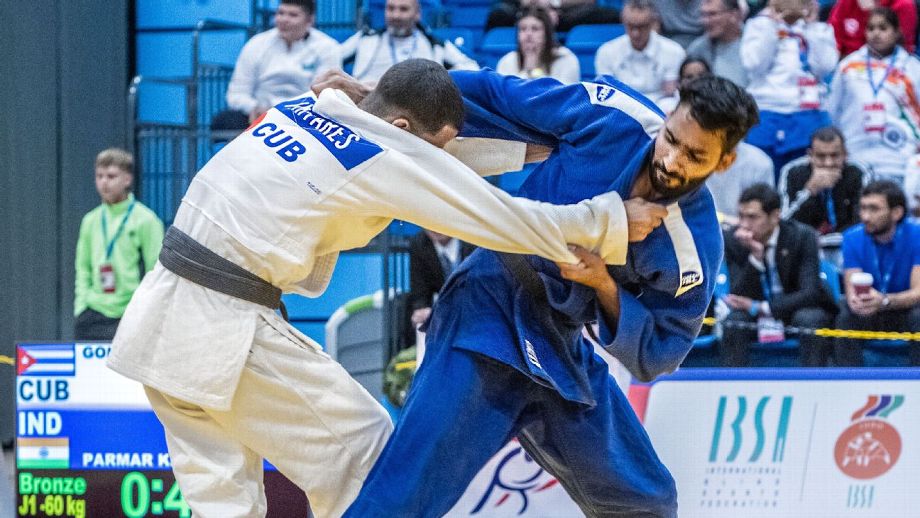In a remarkable achievement for Indian sports, Kapil Parmar made history by becoming the first Indian judoka to win a medal at the Paralympics. His bronze in the men’s 60kg J1 category at the Paralympic Games has not only brought immense pride to the nation but also highlighted the power of resilience, determination, and teamwork. Kapil’s victory is a testament to his years of hard work and the guidance of his coach, Munawar Anzar Ali Siddiqui.
The journey to Paralympic success wasn’t easy for Kapil, who had to overcome both physical challenges and fierce competition. Yet, with an unwavering spirit and the support of his team, he realized his dream in Paris. In this article, we explore Kapil’s inspiring journey, the significance of his win, and the role his coach played in this historic moment.
A Dream Realized: Kapil Parmar’s Path to Bronze
Kapil Parmar’s bronze medal in the Paralympics is the culmination of years of dedication, sacrifice, and a clear vision of his goals. Competing in the men’s 60kg J1 category, Kapil faced formidable opponents, including Brazil’s Elielton De Oliveira, whom he defeated by Ippon in the medal bout. This victory was especially sweet as Kapil had previously beaten Oliveira at the IBSA Judo Grand Prix in Antalya, and his familiarity with the Brazilian’s style gave him the upper hand.
Ranked world No. 1 in his category, Kapil entered the competition with high expectations. However, his journey to the podium wasn’t without obstacles. In the semifinal, he faced Iran’s Seyed Meysam Abadi and lost by Ippon in a closely contested match. Despite the setback, Kapil remained focused and determined, knowing that the bronze medal was still within his reach. In the bronze medal bout, he executed his strategy flawlessly, capitalizing on Oliveira’s early mistake to secure a historic win.
From Sehore to Paris: Kapil’s Inspirational Journey
Kapil’s journey to Paralympic glory began in Sehore, Madhya Pradesh, where he was born to a taxi driver father. His life took a dramatic turn when he lost his vision in a tragic accident involving an electric shock from a motor pump. While many would have been overwhelmed by such a life-altering event, Kapil found a new path through sports. Encouraged by a teacher to take up judo as a way to channel his energy, Kapil embraced the sport with determination and passion.
Kapil’s early days in judo were marked by challenges, but his resilience shone through. He eventually moved to Lucknow to train at the Indian Para Judo Academy, where his skills and potential began to flourish. Under the guidance of his coach, Munawar Anzar Ali Siddiqui, Kapil’s judo career took off, leading him to national and international success. His journey from a small town in Madhya Pradesh to the grand stage of the Paralympics is an inspiring story of overcoming adversity and pursuing one’s dreams against all odds.
The Crucial Role of Coach Munawar Siddiqui: A Partnership Built on Trust
Kapil’s success at the Paralympics is as much a result of his own hard work as it is a reflection of the crucial role played by his coach, Munawar Anzar Ali Siddiqui. For a visually impaired athlete like Kapil, the coach’s guidance and instructions are essential during a bout. Kapil has to rely heavily on Munawar’s voice and strategic input to navigate the mat, execute techniques, and counter his opponents.
Munawar’s coaching goes beyond traditional methods. He helps Kapil familiarize himself with the competition venue, from the judo mat to the warm-up areas and even the bathrooms. This comprehensive preparation ensures that Kapil is mentally and physically ready to perform at his best. Munawar’s ability to communicate strategies during the match and his hands-on approach in teaching judo techniques have been pivotal in Kapil’s development as an athlete.
Speaking about his coach’s role, Kapil said, “When you don’t see, it’s a special moment to step on the tatami. You have to rely entirely on your feelings and on the coach. He is the one who tells you what to do and where to go. You have to be fully confident. I could recognize his voice in any situation.” This deep bond of trust and understanding between Kapil and Munawar has been key to their success.
The Semifinal Setback and the Mental Strength to Bounce Back
Kapil’s path to bronze was not without its challenges. In the semifinal, he faced Iran’s Seyed Meysam Abadi, a fierce competitor who managed to defeat Kapil by Ippon. This loss was a setback, but Kapil didn’t let it deter him. Instead, he regrouped mentally and prepared himself for the bronze medal bout. His ability to bounce back from the disappointment of the semifinal and deliver a winning performance in the next match speaks volumes about his mental strength and resilience.
The semifinal loss could have easily shaken Kapil’s confidence, but his focus on the bigger picture and his unwavering determination kept him on track. With his coach’s guidance and his own belief in his abilities, Kapil was able to put the loss behind him and concentrate on securing the bronze medal. This mental toughness is a defining characteristic of top athletes, and Kapil demonstrated it brilliantly on the Paralympic stage.
A Victory Shared: The Influence of the Indian Para Judo Academy
Kapil’s success is also a testament to the Indian Para Judo Academy in Lucknow, where he honed his skills and trained under the expert guidance of Munawar Siddiqui. The academy has been instrumental in shaping Kapil’s judo career, providing him with the resources, training, and support needed to compete at the highest level. The academy’s role in nurturing para-athletes like Kapil highlights the importance of dedicated training facilities and coaching for athletes with disabilities.
The Indian Para Judo Academy has become a hub for aspiring judokas, and Kapil’s success will undoubtedly inspire more athletes to pursue the sport. The academy’s emphasis on technique, discipline, and mental preparation has been crucial in developing Kapil’s all-around abilities as a judoka. As India continues to make strides in para-sports, the role of such training centers will be vital in producing the next generation of Paralympic champions.
The Move That Sealed the Bronze: A Team Effort
The move that earned Kapil his bronze medal—a well-timed Ippon against Oliveira—was the result of meticulous planning and execution. Much of the credit for this successful move goes to Munawar, who guided Kapil with precise instructions during the bout. The coach’s ability to read the situation and communicate effectively with his visually impaired athlete made all the difference in the medal-deciding match.
Munawar’s approach to coaching Kapil involves not only physical training but also a deep understanding of how to adapt techniques for a visually impaired athlete. He has to physically show Kapil the movements by guiding his hands and feet, helping him internalize the techniques before implementing them in competition. This unique coaching dynamic underscores the importance of teamwork in individual sports like judo, where the athlete and coach must work in perfect harmony to achieve success.
A Legacy in the Making: Kapil Parmar’s Impact on Indian Para-Sports
Kapil Parmar’s bronze medal at the Paralympics is more than just a personal achievement—it is a milestone for Indian para-sports. His success will undoubtedly inspire a new generation of athletes with disabilities to pursue their dreams, knowing that with hard work, dedication, and the right support, anything is possible. Kapil’s journey from Sehore to Paris is a shining example of the transformative power of sports and the impact it can have on individuals and communities.
As Kapil celebrates his historic win, he is already looking ahead to the future. With his eyes set on more international competitions and Paralympic Games, Kapil is determined to continue his journey and bring more glory to India. His story is a reminder that success is not just about talent but also about resilience, teamwork, and the unwavering belief in one’s abilities.
Kapil Parmar’s bronze medal is a proud moment for India and a symbol of the potential that exists within the country’s para-athlete community. With the right support and opportunities, there is no limit to what these athletes can achieve.
Please check for information on the best betting sites in India – https://selectory.org/best-betting-sites/















